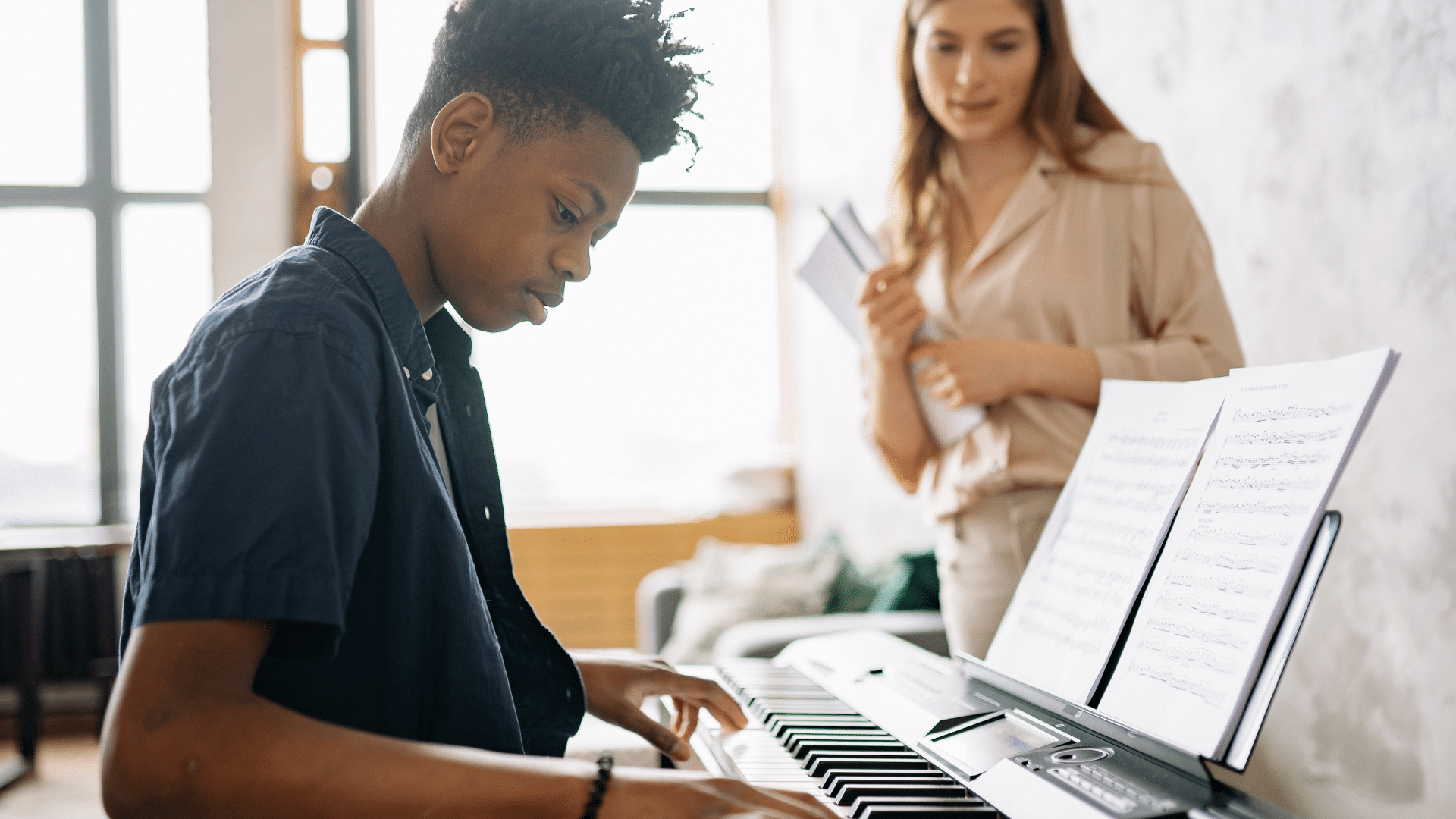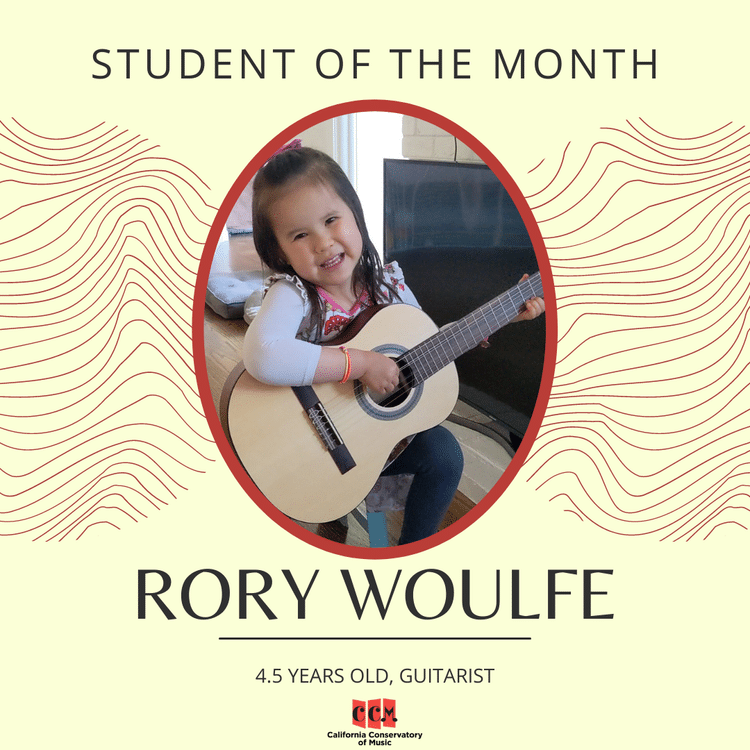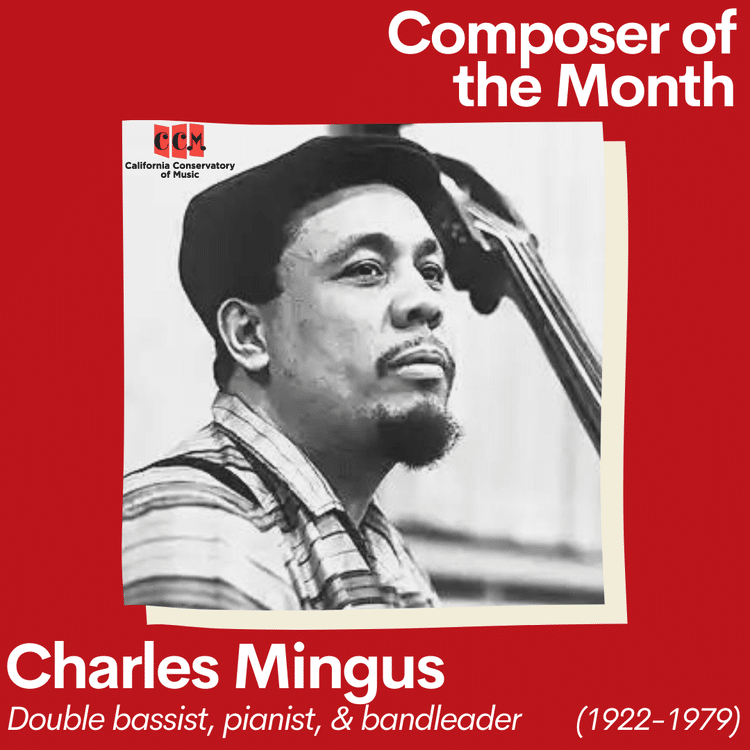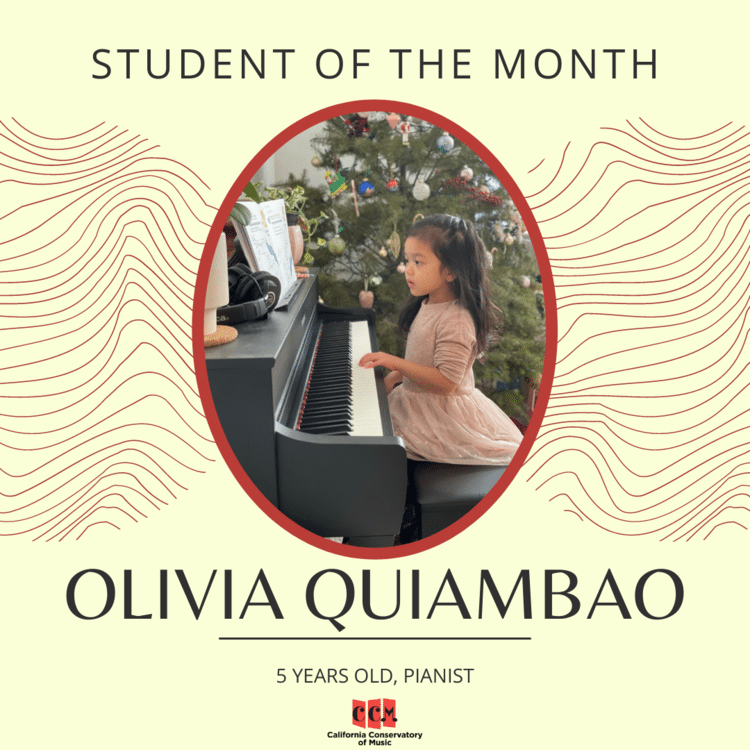Are you looking for a way to help your children with school? If so, you may want to consider enrolling them in music lessons. Believe it or not, learning how to play an instrument can actually help improve academic performance. In this blog post, we will discuss the benefits of music lessons and how they can help your children succeed in school.
Teaches Concentration and Focus
One of the most important things that music lessons can teach your children is how to concentrate and focus. In order to play an instrument, your child will need to be able to block out all distractions and focus on the task at hand. This skill will come in handy when they are trying to complete their homework or take a test at school.
Increases Memory Capacity
Another benefit of music lessons is that it can help increase your child’s memory capacity. When your child is taking piano lessons, they will need to remember the notes that they are playing. This requires them to remember where their hands are supposed to be on the keyboard at all times. By practicing this regularly, your child will be able to increase their memory capacity, which will help them in school.
Can Help Develop Speech Cognitive Skills and Social Abilities
Music lessons can also help develop your child’s speech, cognitive skills, and social abilities. For example, piano lessons for beginners will require your child to read sheet music. This will help them with their reading comprehension skills. In addition, playing an instrument in a band or orchestra will teach your child how to work well with others and be a team player.
Helps Boost Their Self-Esteem
Music lessons can help boost your child’s self-esteem and confidence. Once your child masters a song, they will feel a sense of accomplishment that will stay with them for a lifetime. This is an important trait to have, especially during their teenage years.
Helps Them Learn Patience
Finally, music lessons will teach your child the importance of patience and discipline. Learning how to play an instrument takes time, effort, and practice. By enrolling your child in music lessons, you can help them develop these important life skills.
So, if you are looking for a way to help your children with school, consider enrolling them in music lessons. The benefits are numerous and your child will thank you for it later on in life. California Conservatory of Music offers piano lessons and guitar lessons for beginners in San Jose. Contact us today to learn more about our music programs!
Teaching your child to play a musical instrument with guitar lessons or other music lessons can be rewarding in many ways. Not only is your child learning to hone their skills in music, but playing an instrument can be a great way to help them fine-tune motor skills, boost cognitive thinking and problem solving skills, and teach them how fulfilling expressing themselves through creativity can be. However, for young minds, practicing in between piano lessons or guitar lessons can feel very different than playing their instrument, so helping them to get in the habit of practicing can be difficult. At the California Conservatory of Music, we’re here to help parents like you encourage your child to practice so they can hone their instrumental skills in between their music lessons!

Recognize They Are Trying
A common trap we find parents falling into is the pursuit of “perfection.” While this is generally well-meaning, some children may find the pressure of achieving musical perfection too much and develop an aversion to practicing around others. Avoid this pitfall by recognizing that your child is trying their best when they practice, instead. Encouragement is key when it comes to fostering a love of music and healthy practicing habits! If your child seems to be struggling to practice, try talking to them to understand where any frustrations may be coming from, and either provide them with insight or write it down as a question to ask during their next music lesson.
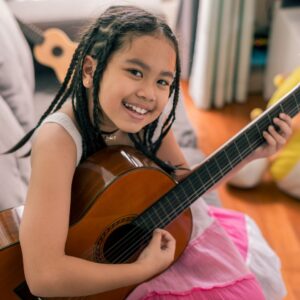
Verbally Express Their Improvements
Many parents know that expressing pride or that you’re impressed is a great way to encourage children to continue with good habits. Practicing music is no different! When your child is learning and improving in their guitar lessons or their piano lessons, you can continue to encourage their progress by verbally expressing that you see them improving. Little comments noting that you recognize the hard work and dedication they’ve invested in their instrument can go a long way toward encouraging good practicing habits.
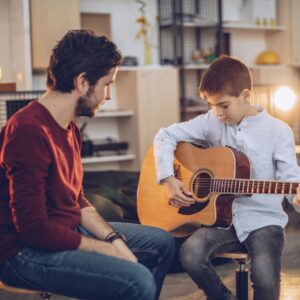
Listen To Them Play
One of the best ways to improve your child’s confidence in practice and encouraging them to continue playing is to listen to them! Music is all about creative expression and sharing the beauty of melodies and harmonies, so show your child that you appreciate their creativity by sitting down to listen to their music, and once they’re done playing, offer up compliments on aspects you liked about their playing! If they ask for constructive criticism, provide a note or two on things they may improve on, but try to keep it positive so they don’t get discouraged!
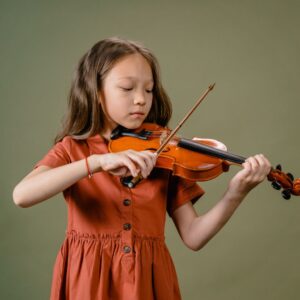
Set Up a Routine of Practice
Humans are often creatures of habit. From waking up at the same time every day to eating dinner together every evening, children grow and benefit from structure throughout the stages of childhood. To that end, encouraging your child to practice for their piano lessons or guitar lessons at the same time every day can be a game changer! By encouraging a routine, your child is more likely to develop healthy practicing habits for their instrument.
Learn more about piano lessons for beginners, guitar lessons, or children’s music lessons, all available from the California Conservatory of Music. Get started with lessons for your child by contacting us today!

July 2022 Student of the Month – Lauren Murphy
This month, we’re happy to feature CCM violin student, Lauren Murphy as our July 2022 Student of the Month! Lauren has been taking violin lessons for almost two years at CCM’s Sunnyvale location with Teacher Kathy. We are all proud of Lauren’s hard work and dedication and always enjoy listening to her perform at the CCM recitals!
Student of the Month – Lauren Murphy
Q: What is your name?
A: Lauren Murphy
Q: How old are you?
A: 7 years old
Q: Who is your teacher?
A: Ms. Kathy
Q: How long have you been taking violin lessons?
A: About 2 years
Q: What advice would you give to a violin student just starting out at CCM?
A: Pick up your violin every day, even if it’s just a short time
Q: What piece are you looking forward to learning someday?
A: Any song from Kiki’s delivery service
Q: What is your favorite thing about playing violin?
A: I enjoy getting to know many songs
Q: What is your favorite food?
A: Pasta
Q: Do you have a pet?
A: No
Q: Do you play any sports or do any other activities outside of music lessons?
A: Tennis, swimming, ballet
Q: What do you want to be when you grow up?
A: A doctor, a teacher like Ms. Kathy
Q: What is your most memorable experience at CCM?
A: The Recital, I was nervous but I enjoyed it
……………………………………………………………………………………………………………………
Parent Spotlight – Tomoko Murphy
Q: Regarding violin, what are you most proud of your child accomplishing?
A: She practiced hard, and performed in front of an audience at the recital
Q: What advice would you give a new parent starting in the program?
A: Be patient !
Q: Why did you decide to give your child a musical upbringing?
A: She was interested in violin, and asked for lessons for her birthday present.
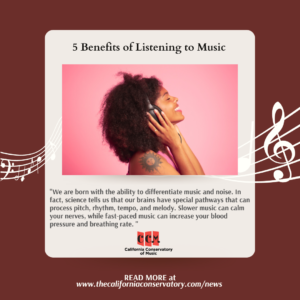
It’s pretty incredible how the simple act of listening to a piece of music can bring a rush of memories back to your head or make you feel happy and at peace.
We are born with the ability to differentiate music and noise. In fact, science tells us that our brains have special pathways that can process pitch, rhythm, tempo, and melody. Slower music can calm your nerves, while fast-paced music can increase your blood pressure and breathing rate.
While we certainly need more studies to confirm the many benefits music has on us as humans, there are several positive effects we are already sure of.
Come dive in as we explore the 5 benefits of listening to music.
Relieves Stress
Listening to music when you are feeling stressed out can decrease the levels of cortisol in your body. Cortisol, for those who don’t know, is the stress hormone. Essentially, listening to music can counteract the negative impact of chronic stress.
Stress is the cause of 60% of diseases and illnesses in humans. A recent study showed that people who actively participate in the music-making process had a boosted immune system, even more so than from listening passively. Essentially, singing along to a piece of music or playing around with percussion can make you healthier.
Who knew?
If you’re ever feeling stressed out during the workday, turn on your favorite song and sing along!
Helps You Sleep
Did you know that more than 30% of Americans suffer from insomnia?
A recent study showed that people who listen to classical music 45 minutes to an hour before going to bed sleep significantly better than those who don’t listen to anything at all.
If you ever find that you are having trouble sleeping at night, you might consider trying to play a bit of Mozart or Bach.
Not only can music help you fall asleep faster, but it can also help facilitate deeper and longer sleep, which will leave you feeling refreshed when you wake up in the morning rather than groggy and unrested.
Improves Concentration
If you’ve ever tried working in a noisy room or a room that is totally silent, you might have felt it was hard to concentrate. Of course, everyone is different, and some people don’t like listening to music while studying or working.
However, it’s worth trying out, as many research studies say listening to the right kind of music while working or studying can put you in the right mindset for getting work done.
Studies say that the best genres to study or work to include classical music, instrumental chill-out music, or the simple sounds of nature. Doing so can improve focus, lessen distractions, increase concentration, and reduce learning time.
Helps Develop Social Skills
There are many children that face the challenge of adapting to their environment socially. One of the best ways to help a child with social developmental difficulties is to introduce them to music. We recommend teaching your child how to play a musical instrument or encouraging them to be part of a singing group.
Music can be a major help in developing social skills, showing a person how to relate with others and work in a team setting. It can also show children how to appreciate their achievements and awards while giving them a sense of discipline and leadership.
Improves Motor Skills
Similar to playing sports, playing a musical instrument can develop a child’s motor skills. It requires motor skills to simply dance or sing along to music. Add the coordination necessary to play a musical instrument, and a child can develop quickly in incredible ways.
This is because making music is incredibly involved. It goes beyond the fingers or the voice. To make music, you must use your eyes and ears, as well as a number of small and large muscles throughout your body at once.
In a way, making music teaches the body and the mind to work as a single unit.
Music For Life
As you can see, there are many benefits to music, whether you are a child or an adult. For these reasons, it’s important to expose yourself and your children to music as much as possible. Sing, play instruments, attend local concerts, or play musical games.
Reach out to the California Conservatory of Music to enroll yourself or your child in private music lessons!
Keep music with you at all times, and you can lead a happier, healthier life.

This July, we’re showcasing one of the most important composers in American History — John Philip Sousa.
Known as the 17th Director of the President’s Own and the writer of Stars and Stripes Forever, traditional American music would not be where it is today without his talents.
John Philip Sousa’s Personal Life
John Philip Sousa was born in Washington D.C. on November 6, 1854, as the third of ten children to Portuguese parents. Sousa began his music education at an early age, learning solfeggio under the tuition of John Esputa Sr.
However, Esputa Sr. was known for his poor temper, which is why he eventually began studying with his son, John Esputa Jr., where he learned to play the piano, violin, flute, and a number of brass instruments.
It was during this time that he progressed very rapidly, writing his very first composition, “An Album Leaf.” However, when Esputa Jr. dismissed his piece as a “bread and cheese” composition, it was thrown away for good.
Sousa’s father played in the Marine Band as a trombonist, eventually listing Sousa in the United States Marine Corps when he was only 13 as a way to deter him from playing in a circus band. During that same year, Sousa studied music under George Felix Benkert.
By 1875, Sousa began performing with his violin after completing his apprenticeship with the United States Marine Corp. He also learned to conduct after joining a local theatrical pit orchestra. In 1880, he returned to the Marine Band as the head of the band, where he would retain the role of conductor until 1892.
During this era, he was asked to lead the “President’s Own” band by Rutherford B. Hayes and Benjamin Harrison.
In 1893, Sousa worked with instrument maker J.W. Pepper to create a marching brass instrument known as the sousaphone. They did so by modifying a helicon. By Sousa’s request, he wanted a tuba that could play over a band, whether the band was marching or seated. In 1898 C.G. Conn made updates to the instrument, which was the version that Sousa would continue to use throughout his career.
When he eventually left the Marine Band in 1892, he started the Sousa Band and toured from 1892 to 1931, performing over 15,600 concerts throughout America and the rest of the world. Some of his most famous performances took place at the Royal Albert Hall in London and the World Exposition in Paris.
The Sousa Band also played in eight parades throughout its time touring, one of the most popular parades of which was the Arc de Triomphe.
After spending many years playing and touring, Sousa retired to his home in Sands Point, New York, where he died of heart failure at 77 years old in 1932. The day before his death, he conducted a “Stars and Stripes Forever” rehearsal with the Ringgold Band.
The Influence of John Philip Sousa’s Music
Throughout his career, Sousa wrote over 130 marches, 28 fantasies, 24 dances, 15 operettas, 11 suites, and five overtures, as well as a number of western European symphonic works.
Sousa composed one of his most famous marches, “Stars and Stripes Forever,” on Christmas Day in 1896, when he was aboard an ocean liner on his way back home from vacationing in Europe with his wife. Because he did not have any materials on the boat, he composed the piece in his head and committed the notes to sheet music upon his arrival in the United States.
The first-ever performance of “Stars and Stripes Forever” took place on May 14, 1897, at Willow Grove Park, a large park just a bit outside of Philadelphia. Concert-goers were said to have immediately greeted the piece with enthusiastic attitudes.
After an Act of Congress in 1987, the piece was adopted as the United States’ official national march.
Even many years after his death, people still referred to Sousa as “The March King.” A non-profit organization known as the John Philip Sousa Foundation was founded in 1981 to recognize superior music students for loyalty, dependability, musicianship, and cooperation.
Notable Facts
- During his early studies with John Esputa Jr., Sousa was found to have perfect pitch.
- His home, historically known as Wiltbank, has been designated as a National Historic Landmark.
- Sousa did not always want to be a musician. In fact, for a long time, he said he wanted to be a baker.
- Sousa composed the very first official Marine march, “Semper Fidelis.”
This month, we’re delighted to feature CCM guitar student, Rory Woulfe, as our May 2022 Student of the Month! Rory has been taking guitar lessons for around 4 months at CCM’s Redwood City location with Teacher Sebastian O. She just completed her 50-day challenge and teacher Sebastian says she is always very enthusiastic and excited to learn!
Read below to see Rory’s advice for CCM students just starting on their musical journey, and don’t forget to check out the parent spotlight as well.
Q: What is your name?
A: Rory Woulfe
Q: How old are you?
A: Four and a half years old
Q: Who is your teacher?
A: Teacher Sebastian O
Q: What advice would you give to a guitar student just starting out at CCM?
A: Focus and try your best!
Q: What piece are you looking forward to learning someday?
A: Let it Go
Q: What is your favorite thing about playing guitar?
A: Being able to play an entire song (Twinkle Twinkle)
Q: What is your favorite food?
A: Quesadillas
Q: Do you have a pet?
A: Yes, two dogs, Milo and Macy
Q: Do you play any sports or do any other activities outside of music lessons?
A: Swimming, dance, and gymnastics
Q: What do you want to be when you grow up?
A: Dancer, singer, engineer
Q: What is your most memorable experience at CCM?
A: Learning to put the squishy part of my arm on the edge of the guitar
……………………………………………………………………………………………………………………
Parent Spotlight – Leslie Liang
Q: Regarding guitar, what are you most proud of your child accomplishing?
A: Guitar is the one thing that Rory willingly does every single day. The CCM daily practice reward system is really effective (as is Teacher Sebastian!), but I am also proud that Rory takes pride in her constant improvement.
Q: What advice would you give to a new parent starting in the program?
A: If your child is starting out young, meet them where they are with how they are processing and learning. For us, that has meant lots of mnemonics, animal analogies, and gamification of practice time. I also bought myself a guitar so that we could make learning guitar a parent-and-me experience, which has been helpful with focus and motivation.
Q: Why did you decide to give your child a musical upbringing?
A: I grew up playing the violin and piano, and it provided such a great community for me, as well as a foundation for an appreciation of the arts and culture. I hope for Rory to have that too, and to be able to use music as a universal language to connect with others throughout her life.
This month we’re so excited to feature CCM piano student, Joshua Thomas, as our April 2022 Student of the Month! Joshua has been taking piano lessons for around 10 months at CCM’s Sunnyvale location with Teacher Brennan. As of now, he is the only student of teacher Brennan’s to have completed the 100-day practice challenge!
Read below to see Joshua’s advice for CCM students just starting on their musical journey, and don’t forget to check out the parent spotlight as well.
Q: What is your name?
A: Joshua Thomas
Q: How old are you?
A: 6 years old.
Q: Who is your teacher?
A: Teacher Brennan.
Q: What advice would you give to a piano student just starting out at CCM?
A: Just to keep trying and keep practicing, even when it’s hard. It gets easier.
Q: What piece are you looking forward to learning someday?
A: Pieces from the movie La La land
Q: What is your favorite thing about playing piano?
A: I like learning new songs and then getting good at them so it becomes really fun to play and sing.
Q: What is your favorite food?
A: XLB dumplings and burgers
Q: Do you have a pet?
A: No, but I really want a dog. My parents said they might let me get a goldfish this year at least.
Q: Do you play any sports or do any other activities outside of music lessons?
A: Swimming, soccer, basketball, snowboarding, and playing Pokémon and chess.
Q: What do you want to be when you grow up?
A: I want to be a chef when I grow up.
Q: What is your most memorable experience at CCM?
A: Getting the 100-day practice trophy. I’m working towards getting the 1-year practice trophy.
……………………………………………………………………………………………………………………
Parent Spotlight – Marjorie Chen
Q: Regarding piano, what are you most proud of your child accomplishing?
A: I’m most proud of Joshua sticking with learning piano, even when it was frustrating in the beginning. He was able to get over the initial hump, started practicing everyday, and now really enjoys playing piano. I love that he enjoys playing piano, and it’s not a chore to get him to practice. It’s also really rewarding to see how happy he gets whenever he masters a new piece. This has helped him build resiliency.
Q: What advice would you give to a new parent starting in the program?
A: Build the habit of practicing everyday, even if it’s just a few minutes on busy days. We saw a huge improvement when Joshua started playing a little everyday as part of his daily routine, versus having longer but less frequent practice sessions. CCM’s daily practice challenge with the milestone awards really motivated my son.
Q: Why did you decide to give your child a musical upbringing?
A: I grew up playing piano and the flute, and I love music. I really valued having a musical background, especially when I got older. I wanted to pass this on to my son, and it’s been great to see his love of music grow!
California Conservatory of Music is continuing to celebrate Composer of the Month and honoring Jazz Appreciation Month by remembering Charles Mingus, a composer, double bassist, and jazz pianist.
Charles Mingus’s Personal Life
Charles Mingus was born on April 22, 1922, in Nogales, Arizona. However, he was raised largely in Los Angeles, California. His mother’s paternal heritage was Chinese and historical records show that his dad was the offspring of a mulatto farmhand and his employer’s granddaughter.
Defined by many as irascible, demanding, and probably a genius, Mingus chose a uniquely iconoclastic path for himself through jazz in the middle of the twentieth century.
He created a legacy that was universally lauded. Mingus’s mother allowed only church-related music in the home; however, he developed an early passion and love for jazz, particularly Ellington’s music. Specifically, Mingus studied trombone and cello.
Life as a Composer
Charles Mingus was a famous American jazz double bassist, composer, pianist, and bandleader. He was a chief proponent of collective improvisation and is considered to be one of the greatest and most influential jazz musicians and music composers in history.
Charles Mingus gained a reputation as a bass prodigy. He even toured with the famous Louis Armstrong in 1943 and played with Lionel Hampton’s band.
His career spanned over three decades and includes collaborations with many other jazz legends, like Duke Ellington, Dizzy Gillespie, Charlie Parker, Dannie Richmond, and Herbie Hancock. You should know that Mingus was briefly an important member of Ellington’s band in the 1950s.
Note that Mingus’s music compositions continue to be played by many contemporary musicians and artists ranging from several repertory bands such as Mingus Dynasty, Mingus Big Band, and Mingus Orchestra to inspiring high school students who like playing the charts and competing in the famous Charles Mingus High School Competition.
In 1942, Mingus played bass with Barney Bigard’s famous ensemble, which also featured trombonist Kid Ory. In the subsequent year, Charles began studying symphonic form and technique formally with Herman Rheinschagen. Mingus toured with Lionel Hampton’s band starting in 1946. In 1950, he gained national attention and fame as a member of Red Norvo’s trio.
Did you know that he also founded the notable Jazz Workshop in 1955? And in 1964, he started his record company, which became popular as Charles Mingus Enterprises.
Notably, in 1993, the Library of Congress acquired Charles Mingus’s collected papers, including sound recordings, scores, correspondence, and photographs in what the Library described as one of the most important acquisitions of a manuscript collection relating to jazz music in its history. This is why students taking music lessons at the California Conservatory of Music are inspired by his work.
EPITAPH
Many consider Epitaph as the masterwork of Charles Mingus. Did you know that it’s a composition that is over 4,000 measures long and requires 2 hours to perform? It was completely discovered during an important cataloging process following his death by renowned musicologist Andrew Homzy.
And with the assistance of a financial grant from the Ford Foundation, the instrumental parts and score were copied. Note that the piece was premiered by a huge 30-piece orchestra, professionally conducted by Gunther Schuller. If you are considering taking piano or violin lessons, you should be familiar with his work.
Notable Facts
- A popular and excellent trio of Mingus, Tal Farlow, and Red Norvo in 1950 and 1951 received considerable critical acclaim.
- In 1972, Mingus’s autobiography Beneath the Underdog was published.
Since his death, Mingus’s fame and importance increased remarkably, thanks mainly to the determined efforts of his widow, Sue Mingus. Also, a posthumous group, Mingus Dynasty, was formed immediately following his death. The concept was expanded considerably in 1991 into the exciting and prolific Mingus Big Band, which has managed to resurrect many of Charles Mingus’s most challenging scores.
If you are looking for violin or piano lessons, Sunnyvale music lessons and Redwood City Music Lessons can provide developmentally appropriate music education for young children, introducing various concepts such as body movement, rhythm, and singing to preschoolers and toddlers.
Do your legs tremble every time you are in front of a crowd? Do you sweat profusely when asked to speak, sing or perform in front of people? If you can relate to any of that, it is very likely that you have stage fright.
What Is Stage Fright?
Feeling heightened nervousness when you are in front of a crowd can translate to stage fright. People with stage fright have the irrational fear of public speaking where they start questioning their self-confidence and self-worth. They find it impossible to have the limelight in front of several people at the same time. This fear can be very embarrassing for people who have a natural talent such as singing or being able to play an instrument. If they ever want to showcase their talent it is very important for these people to get over their stage fright.
However, it is not exactly as easy as it may seem. You might have to make several efforts to regain your confidence and finally be able to stand in front of an audience without having the constant urge to run away.
How can You Get Over Your Stage Fright?
If you have let this fear rule your life, it is about time that you address it and take hold of your life back. Here are some amazing tips that if used can help you get over your stage fright easily. Without further ado, let’s get right on it.
FOCUS ON YOUR AUDIENCE
When you are delivering your performance, it is a wise idea to direct all your attention towards your audience. Instead of focusing on yourself alone, you need to realize why you are standing here in front of the stage. Your biggest concern and motivation has to be your audience as they came here to see you in all your glory.
THINK OF CALMING THINGS AND SCENARIOS
There might be several thoughts running in your mind, it is best if you overcome them by thinking of things that are calming. For example, each time you look at the crowd you can look at them as if they are the sea. If you are singing at a concert think of the audience as waves and you will be able to calm your nerves down and perform at your best.
SUBSIDE NEGATIVE THOUGHTS
It is very important that you acknowledge that you are having negative thoughts but choose to ignore them. This has to be a conscious decision that will ensure that you have control over your thoughts and you can choose what you do with them. This helps you regain control over your thoughts and how you react to them.
PACE YOUR HEART
Each time you set foot on the stage it is possible for your heart to start beating rapidly. When this happens you need to learn to control it. The best way you can do that is by practicing different breathing techniques that might help you calm down your nerves and focus on your performance.
KEEP UP WITH YOUR HEALTH
If you are of sound health, the stage fright might not be able to impact you as much as it does on people who are not very healthy. This is why it is essential that you focus on your health and do not let your stage fright get in the way.
EXCESSIVE PRACTICE
Practice makes perfect. If you put your heart and soul into your practice it will benefit you greatly. once you know that you have all it needs to excel in your performance you wouldn’t have to worry about a thing.
CONNECT WITH YOUR AUDIENCE – MIX WITH OTHER ONE
The chemistry between your audience and you is very important. To ensure that, walk into the crowd with a smile on your face. That will help you establish a good impression on your audience. You can even hype up the crowd by dancing or gesturing them to join your fun.
KEEP A CHECK ON YOUR POSTURE
The posture you maintain throughout your performance is very important. If you are slouching through the performance your audience will pick up on your lack of confidence and that will not leave a good impact on your impression.
DON’T LET MISTAKES HARM YOUR PERFORMANCE
It is perfectly fine if you make mistakes. We all make mistakes. All you need to ensure is that you don’t let that mistake take over your performance. Let it go and focus on the rest of your performance.
This month we’re so pleased to feature CCM piano student, Olivia Quiambao, as our March 2022 Student of the Month! Olivia has been taking piano lessons for around 5 months at CCM’s Sunnyvale location with Teacher Allison. Teacher Allison is so impressed by Olivia’s progress over the last several months and we’re so excited to continue witnessing her piano growth!
Read below to see Olivia’s advice for CCM students just starting on their musical journey, and don’t forget to check out the parent spotlight as well.
Q: What is your name?
A: Olivia Quiambao.
Q: How old are you?
A: Five years old.
Q: Who is your teacher
A: Miss Allison.
Q: What advice would you give to a piano student just starting out at CCM?
A: Be patient and have fun!
Q: What piece are you looking forward to learning someday?
A: Disney songs.
Q: What is your favorite thing about playing piano?
A: Getting stickers from Miss Allison when I’ve played a song well.
Q: What is your favorite food?
A: Pizza.
Q: Do you have a pet?
A: No, but I’d like a pet Unicorn.
Q: Do you play any sports or do any other activities outside of music lessons?
A: Ballet and soccer.
Q: What do you want to be when you grow up?
A: A doctor.
Q: What is your most memorable experience at CCM?
A: When Miss Allison checks off my homework because I feel like I’m getting better and better at piano!
……………………………………………………………………………………………………………………
Parent Spotlight – Christy Quiambao
Q: Regarding piano, what are you most proud of your child accomplishing?
A: I am most proud of the way she keeps practicing when she encounters a difficult song.
Q: What advice would you give to a new parent starting in the program?
A: Keep motivating and inspiring your child so they can push through the basics that may seem boring to them. Olivia keeps on going instead of wanting to quit because she knows one day she can play the songs she wants to play and also eventually pick up violin.
Q: Why did you decide to give your child a musical upbringing?
A: I’ve learned that music really helps with brain development. Olivia has also had an interest in music, whether it be singing, dancing or making up her own song.

